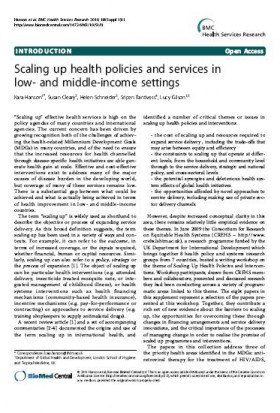This website uses cookies so that we can provide you with the best user experience possible. Cookie information is stored in your browser and performs functions such as recognising you when you return to our website and helping our team to understand which sections of the website you find most interesting and useful.
Scaling up health policies and services in low- and middle-income settings. (2010)

Details
Scaling up health policies and services in low- and middle-income settings.
Kara Hanson1*, Susan Cleary2, Helen Schneider3, Sripen Tantivess4, Lucy Gilson1,5
1Department of Global Health and Development, London School of Hygiene and Tropical Medicine, UK.
2Health Economics Unit, University of Cape Town,South Africa.
3Centre for Infectious Diseases Epidemiology and Research,University of Cape Town, South Africa.
4Health Intervention and Technology Assessment Program, Ministry of Public Health, Thailand.
5School of Public Health and Family Medicine, University of Cape Town, South Africa.
Introduction
“Scaling up” effective health services is high on policy agendas of many countries and international agencies. The current concern has been driven growing recognition both of the challenges of achieving the health-related Millennium Development Goals (MDGs) in many countries, and of the need to ensure that the increased resources for health channelled through disease-specific health initiatives are able generate health gain at scale. Effective and cost-effective interventions exist to address many of the major causes of disease burden in the developing world, but coverage of many of these services remains. There is a substantial gap between what could achieved and what is actually being achieved in terms of health improvement in low- and middle-income countries. The term “scaling up” is widely used as shorthand describe the objective or process of expanding service delivery. As this broad definition suggests, the scaling up has been used in a variety of ways and contexts. For example, it can refer to the outcome, terms of increased coverage, or the inputs required, whether financial, human or capital resources. Similarly, scaling up can also refer to a policy, strategy the process of expansion. The object of scaling can be articular health interventions (e.g. attended delivery, insecticide treated mosquito nets, or integrated management of childhood illness), or health systems interventions such as health financing mechanisms (community-based health insurance), incentive mechanisms (e.g. pay-for-performance contracting) or approaches to service delivery training shopkeepers to supply antimalarial drugs).




